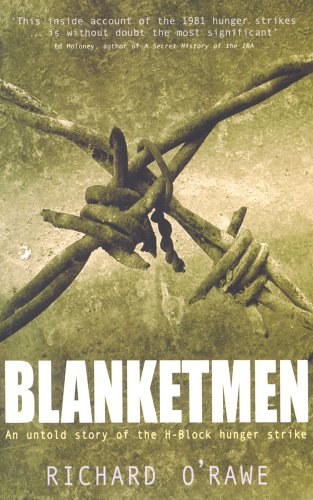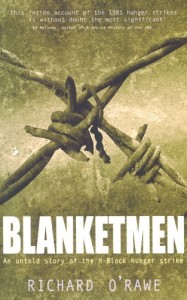Long Kesh revisited
BY JIM GIBNEY
An Phoblacht, 16 August 2001
At approximately 12.30 pm last Friday, 10 August, I stood in silence in the cell where Bobby Sands died 20 years ago. A few minutes later, I was in the cell where Francis Hughes died and a few minutes after that in the cell where Raymond McCreesh died. It was the first time I was in their cells in 20 years. I had visited them at various stages on their hunger strike and as I wandered around the wing of the prison hospital where they spent the last days of their young lives, the memories came flooding back.
I saw Bobby lying on his bed, his mother and sister Marcella by his bed. He was close to the end yet there was a calmness, a serenity about him and the bedside scene. I saw Francis again, as he was, days before his death, lying sick on his deathbed with his mother and brother Oliver by his side. In Raymond’s cell I recalled him telling me, “Francis had a bad night last night. He hasn’t long left.”
As we stood in Francis’ cell, Gerry Adams told the story about the time Don Concannon, Roy Mason’s number two, visited Francis. He arrived at the gaol in a fanfare of publicity. He was a man in a hurry, on a mission. He was a courier with a very important message that Francis had to hear. It would change everything. Concannon told a man close to death, “You have no support. You’re going to die.”
And the man who put fear into the British Crown forces and had them on the run in South Derry; the man who liberated Bellaghy’s Scribe Road, where he played and grew up as a boy with his cousin Tom Mc Elwee, retorted sharply, “Close the door on your way out!”
Everything about the prison hospital was different. Everything was smaller, the reception area, the canteen was narrower. The cells jumped out at you with their doors wide open.
In the hospital canteen, Danny Morrison described a remarkable but heartbreaking scene. Sitting around the table with him were Mickey Devine, Tom McElwee, Kieran Doherty, Kevin Lynch, Laurence McKeown and Joe McDonnell.
Joe was too weak to walk so he was brought in on a wheelchair. Martin Hurson was in his cell too ill to move. Throughout the meeting, the lads attended to Joe, making sure he was alright. Joe’s only concern was to query Danny over whether he had smuggled in cigarettes. He smoked throughout the meeting.
“Where was Bobby’s cell?” Gerry asked me. “There it is,” I said mistakenly, pointing to a warder’s office. “No here it is,” I quickly corrected myself.
“And here up the landing,” I said to Danny, “this cell here, this is where Raymond died.” I shouted for Tom Hartley, who was going through the cells looking for items of historical interest for his vast collection in the Linenhall Library. “Tom c’mere. C’mon see Francis’ cell.”
I watched Maura McCrory, who led the `Relatives’ Action Committee’, the `RACs’, the support organisation for the prisoners, press her body into the corner of the cell where Bobby’s head would have rested on his pillow. She moved her body slowly along the wall against which Bobby’s bed was placed. She was engaged in an intimate, tactile ritual reaching back through 20 years of her own life to touch Bobby on his journey’s end.
Marie Moore, now a Sinn Féin Councillor but 20 years ago an important figure in Sinn Féin’s POW Department, wept quietly in Bobby’s cell.
I looked for the cell where I think I last saw Patsy O’Hara. I couldn’t make up my mind which one it was but the image of him was powerful. Sitting in a wheelchair in a multi-coloured cotton dressing gown, gaunt, his dark hair lined with sweat, he smiled at me and waved his long arm, which lingered for a long time in the air.
The visit to the prison hospital ended too quickly. I would have liked to have spent some time on my own in Bobby’s cell.
The visit was very emotional for all of us. During the hunger strike, we buried our emotions under ten ton of concrete. We couldn’t afford to allow our emotions to surface naturally. Had we done so then we would have been overwhelmed by the sadness of it all, by the burden of watching ten young men slowly dying. We would not have been able to do our job of managing the hunger strike, of building support for the prisoners’ cause on the streets.
But there comes a time when one’s emotions have to be freed up. The visit to the prison and the events commemorating the 20th anniversary of the hunger strike have helped all of us come to terms with the part we played in an epic human and political episode in the struggle for freedom.
The visit to Long Kesh had started at 10am that morning. On board the mini-bus were Dessie Mackin, Marie Moore, Maura McCrory, Mairéad Keane, Danny Morrison, Tom Hartley, Martin Ferris, Larry Downes and myself. Gerry Adams travelled separately.
It wasn’t long before the `craic’ started and the prison experiences were tripping off people’s tongues. I noticed they were all humorous.
We were met at the prison by two warders in civilian dress. They were our official guides, although Gerry quickly assumed the role as our unofficial guide. “There’s the internees’ visiting area,” he pointed out. “Is that the prison hospital?” asked Danny. “No,” said the warder, “That’s the stores. The hospital is over there.”
“Is that Cage 2?” I asked. “No,” said Gerry and the warder interjected, “It’s further on down.”
“Where’s the gate the lads escaped out of?” someone shouted out. “It’s further up the wall. It is blocked up now,” said the warder. “That’s where I was caught trying to escape,” said Gerry, pointing to an area outside the internees’ visiting area. He was sentenced to three years for his efforts.
The first Cage we visited was Cage 6. It was here that Gerry was interned with `Darkie’ Hughes and Ivor Bell. The internees had nicknamed it the `General’s Cage’ because of the number of senior republicans held there. It was from here that the `Dark’ and Ivor successfully escaped and Gerry was caught.
We moved onto Cage 17. Dessie made us all laugh when he told the story about a prank played on him by the `King mixer’, Martin Meehan and `Cleaky’
Clarke in the `70s. Martin wrote a `Dear John’ letter from Dessie’s then girlfriend, now his wife. Dessie was so angry at being `dumped’ that he threw a necklace that his girl had bought him over the wire onto the football pitch. Over 90 men watched Dessie and fell about laughing.
The following morning he had the entire Cage out on the pitch helping him to look for the necklace.
I was keen to visit Cage 3, where I was interned for most of the time I was there. I was disappointed to see Cages 3, 4 and 5 no longer there. The passage of time had taken its toll. All that was left was the concrete base on which the Nissen huts were built.
I went alone to the site of Cage 3. I quickly reflected about myself, an 18-year-old boy, captured, trapped in a strange world, a world that had suddenly shrunk and was framed by barbed wire, gates and locks. I felt sorry for the 18-year-old who never had a normal youth. In the midday sun, breaking through the clouds, I realised I was mourning for a lost youth.
Standing in the middle of the concrete base close to where my bunk bed had been, I travelled back nearly 30 years. I could see the raw energy in the 18-year-old as he stormed around the Cage, pacing seven to the dozen. A lump came into my throat as I watched him receive the news of his father’s death. I looked again at him as he walked from the Cage on eight hours’ parole to bury his father in March 1973.
A smile of pride flashed across my face when I recalled being asked to participate in the escape that saw John Green walk to freedom from Cage 3, dressed as a priest. From the same Cage I watched Mark Graham from the New Lodge Road trying to escape. The plan was that Mark would hide underneath the lorry that brought the internees their food parcels and escape when it left the precincts of the prison. The plan went disastrously wrong when the lorry went over a ramp and the axle snapped Mark’s spine. He never walked again.
I looked at the corner of the hut where a young Joe McDonnell slept or mostly didn’t, because he kept our hut awake most nights with his peculiar brand of humour. Joe was a character.
I `bowled’ round the yard and came to the spot where on 14 September 1974, the prison governor called me and told me I was being released. And then I heard Danny shouting and looked across to his old Cage, Cage 2, which remained intact. The visit to Long Kesh was over.
We gathered ourselves together, boarded the mini-bus and were transported to our own mini-bus for the journey home.
The trip home to Belfast was in marked contrast to the one travelled earlier. There was no `craic’, just silence. We were lost in our own thoughts of what we had all been through. That afternoon I cried sore but I knew the visit did me good. I’ll need a few more visits to the gaol to fully come to an appreciation of the role Long Kesh has played in my life.
It shaped the person I am today and I know it did the same for thousands of others.
That is why Long Kesh should be preserved as a museum, just like Kilmainham.
There’s a story to be told. Thousands of political prisoners, republican and loyalist, passed through its gates and locks. Prison warders also have their story. Let them all be told.
Sourced from An Phoblacht



 Blanketmen
Blanketmen Richard O’Rawe’s book which claims that the six H-Block hunger strikers were allowed to die purely for political expediency is reviewed by Hugh Logue who was part of the team that negotiated to end the hunger strikes
Richard O’Rawe’s book which claims that the six H-Block hunger strikers were allowed to die purely for political expediency is reviewed by Hugh Logue who was part of the team that negotiated to end the hunger strikes This time last week, the name Richard O’Rawe meant little to most people in Ireland. He has no reputation as a political scoundrel, nor has he acquired the notoriety that comes with taking the life of a fellow human being. Although a republican from childhood, there are no photographs of him with a tongue sticking through each cheek, or his nose a foot long. He is not a prominent writer … yet. So there was no particular reason for his name to have generated widespread recognition.
This time last week, the name Richard O’Rawe meant little to most people in Ireland. He has no reputation as a political scoundrel, nor has he acquired the notoriety that comes with taking the life of a fellow human being. Although a republican from childhood, there are no photographs of him with a tongue sticking through each cheek, or his nose a foot long. He is not a prominent writer … yet. So there was no particular reason for his name to have generated widespread recognition. It has withstood the blows of a million years, and will do so to the end.
It has withstood the blows of a million years, and will do so to the end.